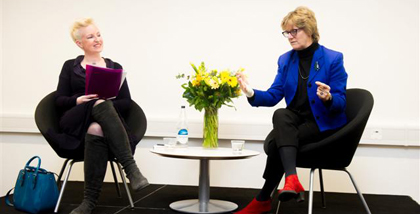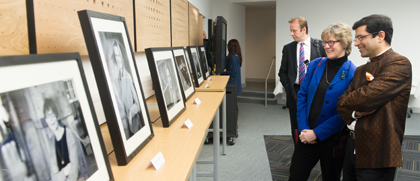Inspiring Women: in conversation with Prof Dame Sally Davies
To celebrate International Women’s Day, the Institute of Psychiatry at King’s College London invited Professor Dame Sally Davies, the Chief Medical Officer (CMO) for England and the Government’s principal medical advisor, to talk about the challenges for women in science.

Dr Amy Iversen & Professor Dame Sally Davies
The event was introduced by Professor Shitij Kapur, Dean and Head of School at the IoP and Professor Elizabeth Kuipers, IoP Athena SWAN Self-Assessment Team welcomed the speakers. Professor Davies was interviewed by the IoP’s Dr Amy Iversen in front of an audience of IoP staff and students.
The event was also an opportunity for the IoP to celebrate its faculty and their contribution to the academic endeavour with an exhibition of portraits of its 31 internationally recognised women professors. You can view the exhibition online.

Professor Dame Sally Davies & Professor Shitij Kapur
Dame Sally is the first woman to hold the post of CMO England. As well as being CMO, she is Chief Scientific Adviser for the Department of Health. In 2006, she developed the National Institute for Health Research (NIHR) which now has a budget of £1billion. She chairs the UK Clinical Research Collaboration, is a member of the Boards of the Office for Strategic Coordination of Health Research, and the Medical Research Council (MRC) and advises many other international committees on research strategy and evaluation.
On being asked what she brought to the role of CMO Dame Sally cited “emotional intelligence” and that she enjoyed “making things happen and having influence, not power”. She told the audience “the best leaders are authentic. When I try being something I’m not it doesn’t work.” On the legacy she would like to leave after her tenure she said “that science and evidence are used to get public policy right and to embed NIHR such that it is enduring. That I championed issues and made a difference to the public and patients.”
She said that being encouraged by people to try new things was a great enabler in her career and when faced with offers and opportunities she would “hold my nose and jump right in”! She said she had taken risk after risk in her career and found it “scary” but her final piece of advice on pursuing a career in science was “don’t do jobs that aren’t fun.” During the interview Dame Sally informed the audience that she would be focusing on mental health for her annual public health report due in 2014).
Dr Amy Iversen is a Senior Clinical Lecturer in Academic Psychiatry at the IoP at King’s. She has had a longstanding interest in medical education from undergraduate level through to continuing professional development and is particularly interested in the role of coaching and leadership mentoring in junior medical careers, and in building leaders in psychiatry. She has recently set up a mentoring scheme for female academic clinicians at King’s to address the gender gap in senior academia which was shortlisted for the Times Higher Education Awards in 2012.
Dr Iversen said: “Dame Sally was an inspiring speaker. She put in place the policy that, in any new competition, applications for NIHR Biomedical Research Centres and Units will only be shortlisted for funding if the university partner (often the medical school) has achieved at least an Athena SWAN Silver award. There are many challenges for women embarking on an academic career in science. Encouraging academic and research organisations to build policies which help support women in science is vital to in promoting women in scientific careers.”
Professor Elizabeth Kuipers and Professor Shitij Kapur said: “Taken alongside evidence that women benefit from female role models, this exhibition looks to celebrate our female academics, and to allow them to serve as role models for all staff, both women and men. Many of our women professors lead departments, vice-deaneries, Clinical Academic Groups, professional bodies, clinical services, research centres and networks, as well as advise government and non-governmental organisations worldwide on matters relating to their field. They influence, shape, develop and deliver strategic vision. They are an inspiration to us all.”